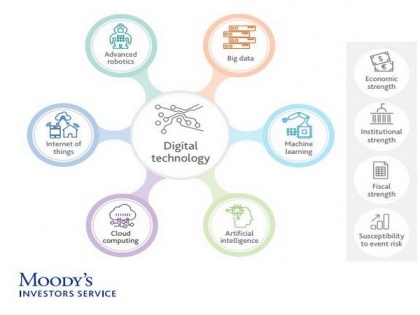Digital technologies to reshape labour markets, industries and credit impacts: Moody's
By ANI | Published: July 28, 2019 09:57 AM2019-07-28T09:57:41+5:302019-07-28T10:15:02+5:30
Advancing technologies have the potential to spur exponential growth in global economic well-being and prosperity, similar to the changes that the steam engine and electricity brought about, according to a new report by Moody's Investors Service.

Digital technologies to reshape labour markets, industries and credit impacts: Moody's
Advancing technologies have the potential to spur exponential growth in global economic well-being and prosperity, similar to the changes that the steam engine and electricity brought about, according to a new report by Moody's Investors Service.
But productivity gains may take time to materialise and growth of the digital economy will bring its own set of challenges. Still, technology adoption has the potential to spur a global productivity boom in an environment where productivity growth is at an all-time low in most countries globally, the report says.
Electricity was introduced in US factories in the 1880s but labour productivity growth did not speed up for more than 20 years until factory layouts (and a generation of managers) changed from machines clustered near the main power source, as had been the case with steam engines to a single floor spread out.
In 1970s, computers' mass-market adoption materialised as productivity gains in the 1990s only after a wave of company business process redesign and the roll-out of large enterprise-wide IT systems that introduced process innovations like vendor managed inventory, cross-docking and efficient consumer response -- reshaping the entire retailing and distribution industries.
Digitisation, which entails the adoption of advanced technologies such as big data, machine learning, artificial intelligence, cloud computing, internet of things and advanced robotics, is aimed at enhancing information processing and the quality of decision making while further automating routine tasks.
Economists label the select few technologies that can change history as 'general-purpose technologies.' Only three technologies previously earned this distinction: the printing press, the steam engine and the electricity generator.
"Today, many experts believe that digital technologies have the potential to spur exponential growth in economic well-being and prosperity, similar to what the steam engine and electricity have done in the past," said Elena Duggar, Chair of Moody's Macroeconomic Board.
"The digital world has different economics from the physical world. As a result, digital technologies can lead to 'winner-take-all economics and result in a rising gap between the 'superstars' and rest of the 'winners' in a field,' she said in the study.
Digital technologies will create new types of work at the same time as they act as substitutes for labour. Repetitive tasks performed by both low- and high-skilled labour will likely be automated. Technology adoption may further increase income inequality by increasing demand for high-skill labour and suppressing wages for low-skill labour.
The study said digital technologies can help governments operate more efficiently and target public services better. "But they will also challenge current taxation structures, income redistribution schemes and education systems. Political risks are likely to rise amid labour dislocations."
The digital economy will be radically different than the past. Agile governments will be needed to embrace the opportunities and challenges created by digital technologies. Forward-looking government policies and prioritising education will help countries better prepare for the era of digitisation.
But credit impacts will depend on policy reforms to improve education, promote human capital development, support entrepreneurship, remove regulatory impediments to new business formation, support better labour-to-jobs matching, support science and innovation, and upgrade infrastructure.
( With inputs from ANI )
Open in app